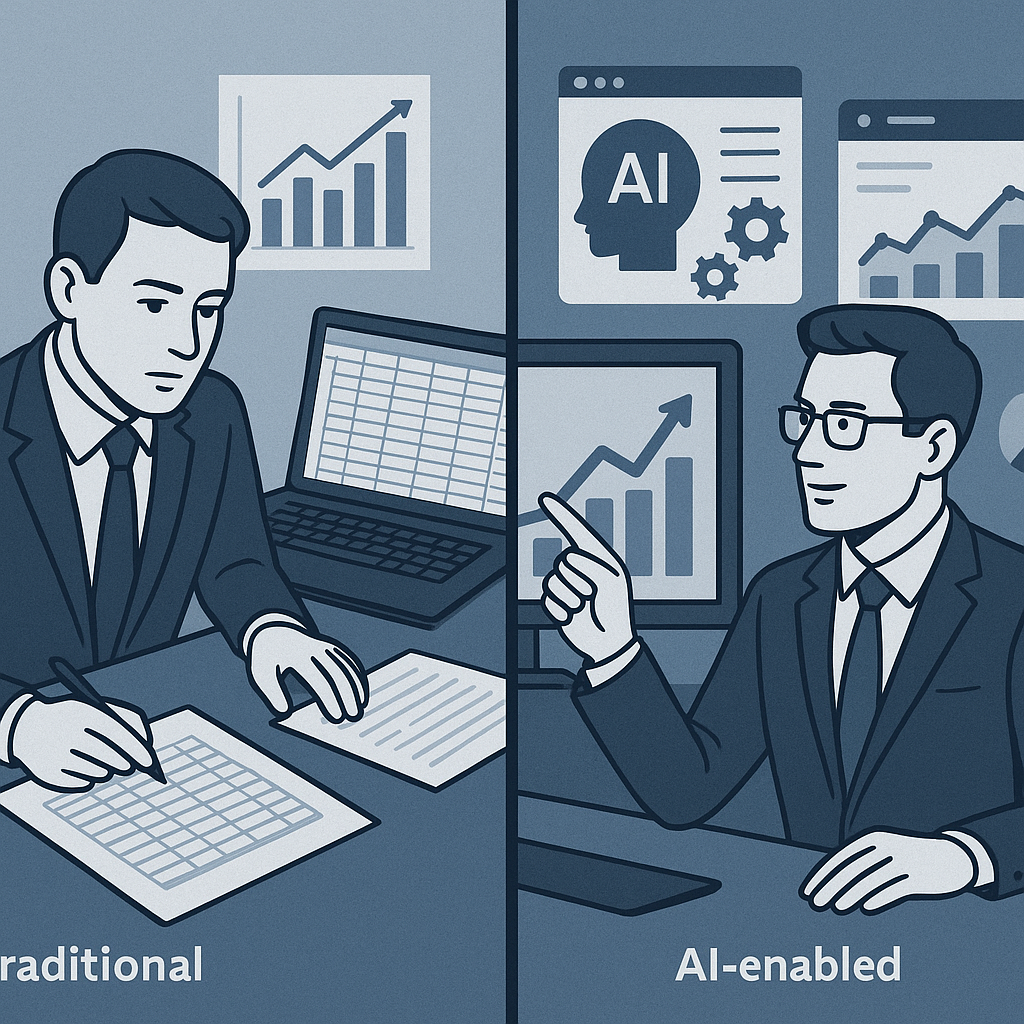
Table of Contents
Are we asking the right questions about AI in finance? The conversation tends to focus on which tasks AI will automate and which jobs it might eliminate. This perspective completely misses the transformational opportunity at hand. A perspective forged through years of navigating real-world enterprise integrations suggests the real challenge isn’t replacement but evolution.
We’ve spent decades building finance teams that excel at process execution. They can close the books with remarkable speed and construct intricate spreadsheets that represent marvels of procedural logic. But what happens when an AI can generate those same outputs in seconds? Longitudinal data from transformation projects reveals a common pattern: teams of brilliant accountants become paralyzed when an AI-generated forecast contradicts their intuition. They don’t trust the machine, yet they lack the analytical vocabulary to effectively challenge its conclusions.
The Evolution from Executor to Interrogator
The future doesn’t belong to the process executor. It belongs to a fundamentally different professional archetype: the AI-Enabled Finance Analyst. This isn’t a data scientist wearing a finance hat. It’s a finance expert who cultivates specific competencies to work collaboratively with intelligent systems.
What distinguishes this evolved professional? Two critical capabilities define their effectiveness.
Analytical Skepticism represents the ability to treat AI output not as a definitive answer, but as a sophisticated hypothesis requiring validation. This analyst asks probing questions: What assumptions did the model make? Which data sources might be incomplete or biased? How can I stress-test this conclusion against alternative scenarios? It’s a form of intellectual friction that produces more reliable insights.
Business Interrogation involves translating vague business problems into precise queries that AI systems can process effectively. Instead of asking, “Why are sales declining?” they frame the question with specificity: “Compare customer churn rates for Product X in the Northeast region against last year’s Q2 performance, excluding customers who received loyalty discounts and factoring in seasonal adjustments.”
This precision isn’t pedantic. It’s the difference between getting generic output and actionable intelligence.
The Leadership Challenge: Building Analytical Capabilities
The responsibility for developing these professionals falls squarely on leadership. It’s not about enrolling everyone in Python bootcamps (a common but often misguided reaction). Insights distilled from numerous complex system deployments indicate that successful organizations invest as heavily in developing analytical thinking as they do in acquiring technology.
Creating an analytically capable team requires intentional culture change. This means rewarding intellectual curiosity over process compliance. It involves providing safe environments where team members can experiment with new tools without fear of making mistakes. Most importantly, it requires leaders who model the behavior they want to see: questioning assumptions, testing hypotheses, and treating uncertainty as an opportunity rather than a threat.
Consider the practical implications. When your team receives an AI-generated cash flow forecast, do they have the skills to evaluate its methodology? Can they identify potential blind spots in the data? Are they comfortable proposing alternative scenarios for testing? These capabilities don’t develop organically. They require deliberate cultivation.
The Skills Gap That’s Actually Holding You Back
Here’s what organizations get wrong about AI readiness: they focus on technical training while ignoring analytical development. Field-tested perspectives highlight that the primary bottleneck isn’t understanding how to prompt an AI system. It’s knowing what questions to ask in the first place.
The most successful AI implementations involve finance professionals who can think like investigators. They approach AI output with healthy skepticism, understand the difference between correlation and causation, and can design experiments to validate insights. These skills bridge the gap between AI capability and business value.
Without this foundation, even the most sophisticated AI tools become expensive report generators. Teams might get faster outputs, but they won’t necessarily get better decisions.
Building Your AI-Ready Finance Team
What does practical development look like? Start with scenarios rather than software training. Present your team with AI-generated analyses and ask them to identify potential flaws or alternative interpretations. This builds analytical muscle without requiring deep technical knowledge.
Create cross-functional partnerships where finance professionals work alongside data analysts on real business problems. This exposure helps finance teams understand both the possibilities and limitations of analytical tools. They learn to speak the language of data without becoming data scientists themselves.
Most importantly, establish clear expectations about intellectual curiosity. Make it acceptable to question seemingly obvious conclusions. Reward team members who identify flaws in existing analyses, even when those analyses were produced by expensive AI systems.
The organizations that thrive in the AI era won’t be those with the most sophisticated tools. They’ll be the ones with teams capable of extracting maximum value from those tools. The technology is rapidly becoming commoditized. The analytical skills to use it effectively remain distinctly human.
Are you building a team that can pilot these new capabilities, or one that will be mystified by them? The investment you make in developing analytical thinking today will determine your competitive position tomorrow.
To discuss strategies for developing an AI-ready finance team, connect with me on LinkedIn.